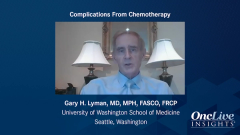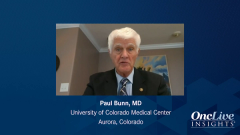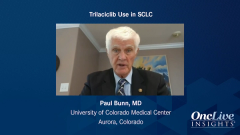
CDK4/6 Inhibitors for SCLC: Trials of Interest
Episodes in this series

Paul Bunn, MD: For small cell lung cancer, platinum doublet therapy has been the backbone of treatment for several decades. More recently, the combination of platinum doublet chemotherapy with etoposide and carboplatin, plus the addition of immunotherapy with either atezolizumab or durvalumab, has become the standard. But myelosuppression remains a huge problem. In the second-line setting, the standard treatment is chemotherapy. Again, in the second line, when people have already been exposed to prior chemotherapy, myelosuppression is a huge deal. There are other cell cycle-related inhibitors. One is called ALRN-6924, which is an MDM2 inhibitor. Like the cyclin-dependent kinases, MDM2 stimulates cell cycle progression. Preventing cell cycle progression with things other than trilaciclib might have very similar results. There’s 1 abstract from a phase 1 trial with this agent, which suggests that it can also lower the rates of grade 3 and 4 myelosuppression with neutropenia, anemia, and thrombocytopenia. But this drug is far behind in its development, compared with trilaciclib. Whether it would add to trilaciclib or be better than trilaciclib is not known, but the fact that it prevents trilineage myelosuppression suggests that this is a strategy that would work in patients treated with chemotherapy. In a way, it adds to the likelihood that trilaciclib will have benefit. It adds another trial and further suggests that this approach may have benefit.
Transcript edited for clarity.













































